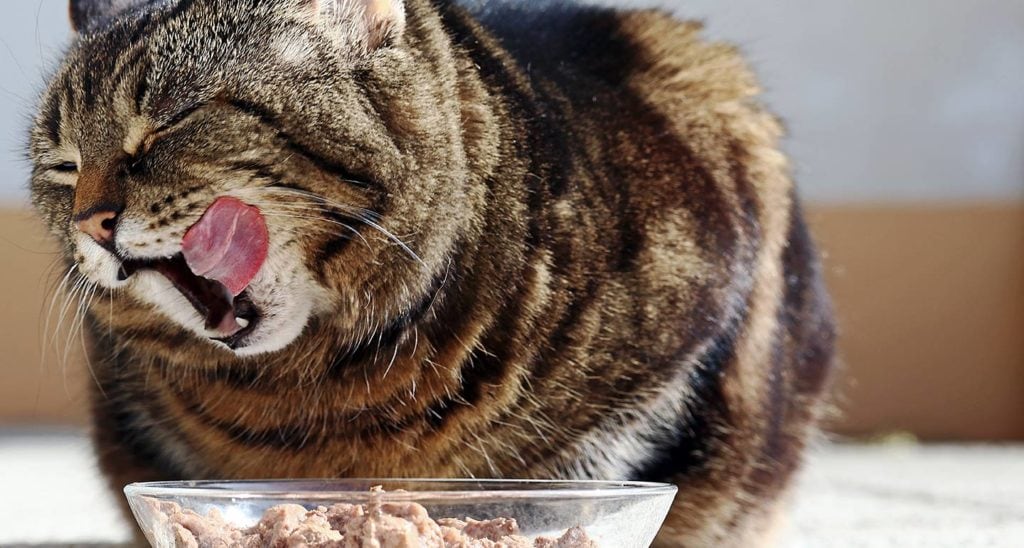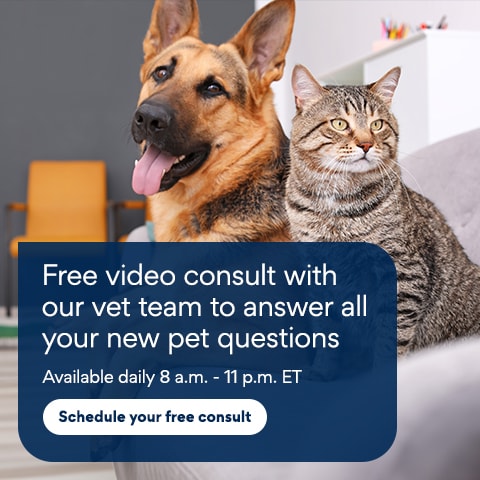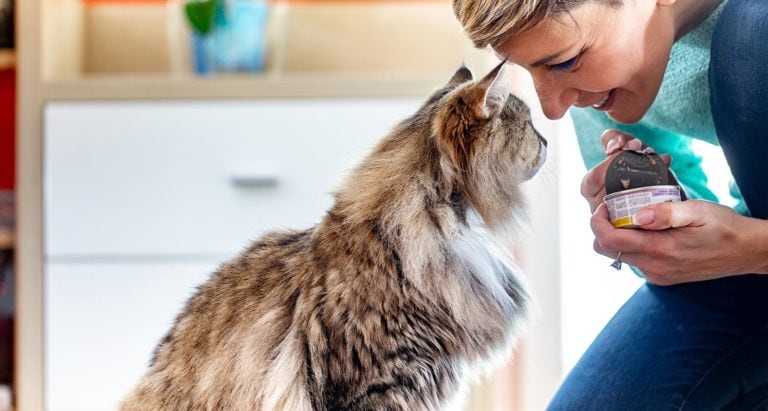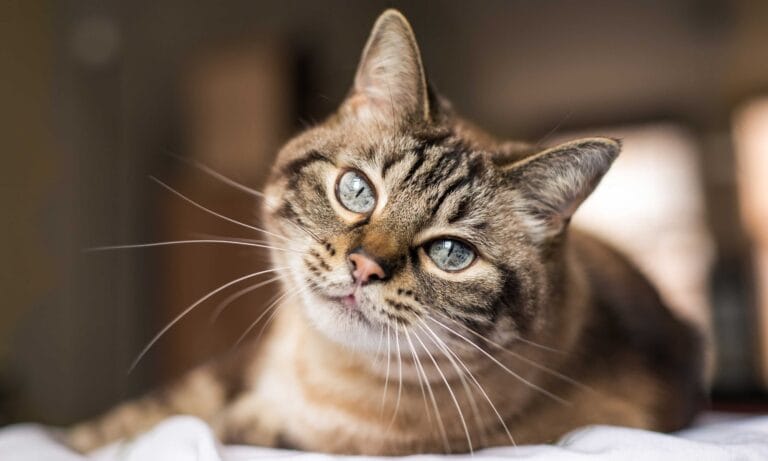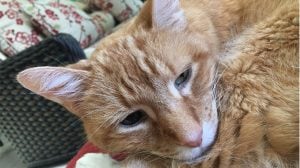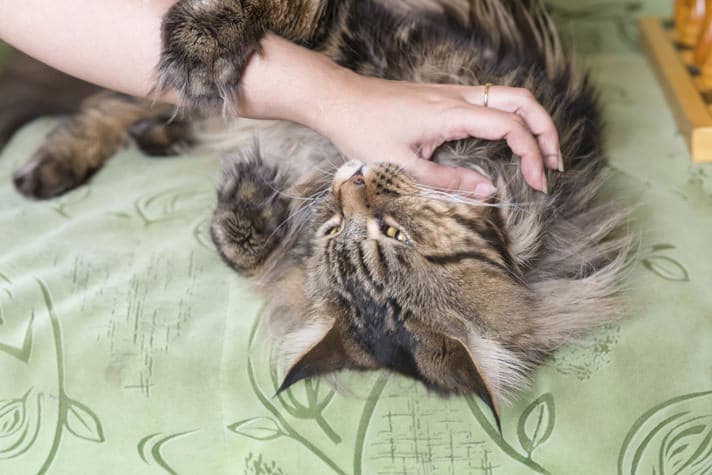Most cats are considered seniors by the time they reach 10 or 11 years of age. Still, many cats now live to 20 or more. Why the longer lifespan? Improved veterinary care and specialized nutrition—which, for some older felines, may mean making the switch to senior cat food.
What to Feed Senior Cats
Depending on your veterinarian’s individual recommendations, you might want to consider a diet especially designed for senior cats. This specialized senior cat food tends to be energy dense and highly digestible to compensate for an older cat’s slower metabolism.
Look for increased levels of antioxidants to slow down aging. Some senior cat food will also include supplements to help with worn-out joints and to combat arthritis.
While cats can use carbohydrates, a senior cat food with a high level of protein is important. That protein must be of high quality with all the necessary amino acids present. Meat protein is generally the best cat food for older cats.
Health problems such as feline kidney disease and feline diabetes are partially managed by diet. Your senior kitty may need prescription food for older cats to help manage their illness.
Always do diet changes gradually. Mix in the new food at a ratio of 25 percent new to 75 percent old at first. After a few days shift to 50/50. Then go to 75 percent new and 25 percent old before making the final switch.
How Much to Feed a Senior Cat
Most senior cats will have about the same caloric needs as an adult cat—roughly 280 to 360 daily calories depending on the normal lean weight—as long as they are healthy. Some older cats will actually have an increase in energy requirements. That increase may be due to a decrease in the ability to digest and utilize calories or it may be due to health problems that are commonly seen in senior cats.
Use your cat’s food label to calculate how much you need to feed your senior cat to meet their caloric requirement. Most cat food has calorie counts on the packaging. Initially, it’s best if you weigh out the daily meals. That will help you feed precise amounts.
Problems with an Older Cat Losing Weight
Certainly, senior cats who are overweight need to diet a bit, but feline obesity is seen more commonly in adult cats. Weight loss is a much bigger problem for most seniors. Therefore, it’s important to evaluate your senior cat’s body and muscle condition at home at least monthly, if not twice monthly. This is especially important for long-haired cats whose luxurious coats may hide significant weight loss.
Assuming you have the calorie count correct for your cat’s normal weight, what are problems that might contribute to an older cat losing weight? Dental problems are high on the list of minor-but-potentially-serious health issues that may lead to a loss of appetite in your cat. Just think about how much a toothache hurts you—one will hurt your cat just as much! Broken teeth, cavities and severe gingivitis are all dental problems that can stop a cat from eating the nutrients they need. Be sure to have your cat’s mouth thoroughly evaluated on their twice-annual checkups. They may need a full veterinary dental workup and cleaning.
Yes, I did say twice annual. Once your cat reaches senior status, it is important to have regular checkups. Just as a kitten can go from healthy to in trouble quickly, so can a senior cat. They also have fewer reserves and often have underlying health problems that contribute to weight loss. Regular blood work can often detect problems early on.
If you can’t find a medical reason why your older cat is losing weight, work on ways to encourage them to eat more. Try warming up their food. That will increase the odors that attract cats to eat. An older cat who can’t smell very well anymore is often unlikely to eat. Add “smelly” things like tuna juice to their food, or consider trying a different flavor of their favorite foods. There are also medical appetite stimulants your veterinarian can try, but if you can get your cat to eat on their own, that is even better.
Watch Their Water Intake
While it is important for all cats to have fresh water available at all times, it is especially vital for older cats. Feline kidney disease can be a silent killer that creeps up on an older cat. Drinking and flushing out toxins helps to keep kidney problems at bay.
If your older cat is drinking less than they should there are ways to tempt them. Consider adding the juice from canned tuna to their water bowl. Some cats are attracted to moving water—a slow drip faucet or a pet fountain may be the stimulus for more drinking. Also, your veterinarian may recommend a move from dry to canned food if you have been feeding a strictly dry diet.
Both feline kidney disease and feline diabetes may show up as your cat drinking more water than usual. At the same time, a cat with diabetes may seem ravenous and will eat more than usual while losing weight. The same symptoms can be seen in hyperthyroidism. Both conditions are treatable and respond best if caught early.
Our senior cats are treasures, and every day with them is a gift. They rely on us to keep them happy, healthy and provided with the very best cat food for older cats. So, make sure you are feeding your senior cat the right amount of calories and monitoring their eating habits!
Read More:
- Pet Gadgets to Help Your Senior Dog or Cat
- 9 Senior Cats and Dogs Living Their Best Life
- Solving Litter Box Problems in Senior Cats
Want to give your pet superior health and nutrition? Chewy offers a variety of premium cat food so you can feed your feline the highest quality ingredients. Shop Chewy's selection of premium cat food here.
Share:
